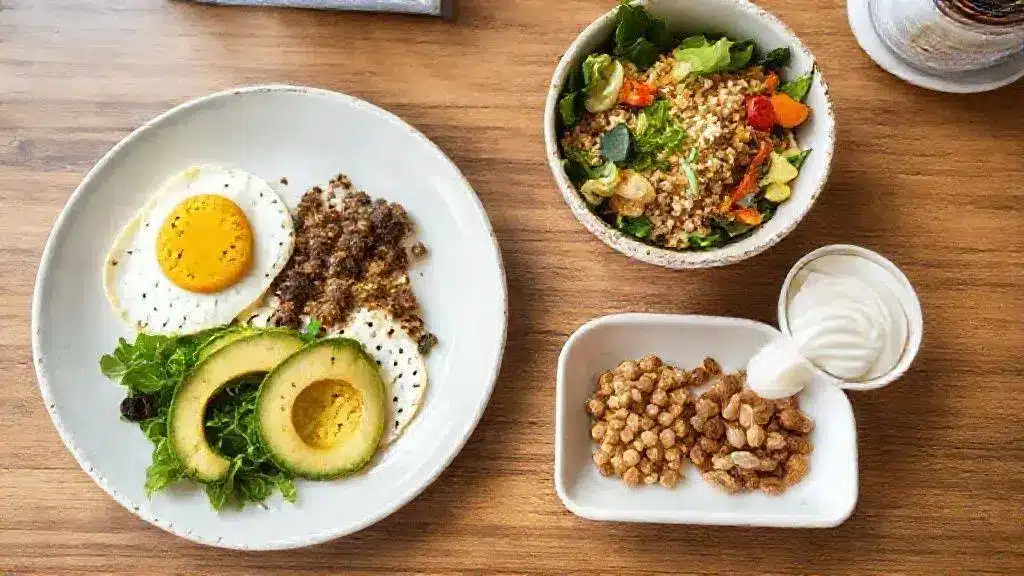Healthy eating tips for energy that actually work

Healthy eating tips for energy include focusing on balanced meals, staying hydrated, timing your meals effectively, and incorporating nutrient-rich foods like fruits, whole grains, and proteins to maintain consistent energy levels throughout the day.
Healthy eating tips for energy are essential for anyone looking to enhance their daily vitality. Have you ever wondered how certain foods can fuel your day-to-day activities? Let’s dive into practical ways to make smarter food choices that keep you energized.
Understanding the link between food and energy
Understanding how food impacts our energy levels is crucial for maintaining overall health. We often ask ourselves why we feel energized after some meals and sluggish after others. The key lies in the nutrients that our body absorbs from food.
One of the main factors connected to our energy is the balance of macronutrients: carbohydrates, proteins, and fats. Each plays a distinct role, and consuming the right proportions can greatly influence your energy levels throughout the day.
Carbohydrates: The Primary Energy Source
Carbohydrates are often dubbed the body’s main energy source. They break down into glucose, which fuels our brain and muscles. Not all carbs are equal, though. Focus on:
- Whole grains like brown rice and quinoa
- Fruits such as bananas and apples
- Vegetables, especially root vegetables
By prioritizing these foods, you not only gain energy but also important fibers and nutrients.
Proteins and Fats: Supporting Roles
Proteins and fats also contribute to energy but do so in more complex ways. Proteins help repair tissues and can provide energy when carbohydrates are low. Foods rich in proteins include:
- Chicken, turkey, and fish
- Legumes like beans and lentils
- Nuts and seeds
Fats are crucial for long-lasting energy. Healthy fats, particularly those from avocados and olive oil, help your body absorb vitamins and can sustain energy levels over time.
In addition to what we eat, how we eat matters. Keeping a balanced plate with the right proportions will help maintain steady energy. Eating smaller, more frequent meals can also prevent energy dips.
Finally, staying hydrated is essential for optimal energy. Water plays a significant role in digestion and nutrient absorption, and even mild dehydration can impact your energy levels.
Choosing the right foods and understanding their effects on your body is vital for sustaining energy throughout your day. By being mindful of your choices, you can fuel your body effectively and feel the difference.
Top energy-boosting foods to include
When it comes to boosting your energy levels, choosing the right foods is essential. Certain foods provide more than just calories; they deliver nutrients that can enhance your vitality and ensure consistent energy throughout the day.
Fruits: Nature’s Energy Snacks
Fruits are packed with natural sugars, vitamins, and minerals that give you a quick energy boost. Opt for:
- Bananas, which are high in potassium and help with muscle function.
- Apples, which contain fiber to regulate blood sugar.
- Berries, like blueberries and strawberries, full of antioxidants and low in calories.
Incorporating these into your diet can help maintain steady energy levels.
Whole Grains for Sustained Energy
Whole grains are another essential food group for energy. They digest slowly, providing lasting energy. Good choices include:
- Brown rice, which is a great complex carbohydrate.
- Quinoa, rich in protein and amino acids.
- Oats, perfect for breakfast as they provide a feeling of fullness.
These foods help combat the energy crashes that often follow the intake of sugary snacks.
Including nut butters like almond or peanut butter in your meals can enhance energy levels too. They’re rich in healthy fats and proteins. Pair them with whole grain bread or fruit for an even better boost.
Additionally, don’t forget about lean proteins. Foods like chicken, fish, and legumes can help you feel full and energized. They provide the necessary amino acids for muscle repair and overall health.
Finally, staying hydrated is vital for maintaining energy. Water helps transport nutrients and keeps your body functioning efficiently. Always aim to drink enough water throughout the day to support these energy-boosting foods.
Meal timing: When to eat for maximum energy

Meal timing can significantly influence your energy levels throughout the day. When you eat is just as important as what you eat. Properly timed meals can help maintain steady energy and prevent crashes.
Start Your Day Right
Having a healthy breakfast is essential for boosting energy. It kickstarts your metabolism and refuels your body after a night of fasting. Foods high in protein and healthy fats, like eggs and avocados, provide lasting energy. Make sure to eat breakfast within an hour of waking up.
Regular Meal Intervals
Eating at regular intervals helps keep your blood sugar stable. Aim to have meals and snacks every 3-4 hours. This prevents energy dips and keeps you alert. Good timing maximizes nutrient absorption and maintains energy levels throughout the day.
- Consider small, balanced snacks between meals, like nuts or yogurt.
- Complex carbohydrates are great for sustained energy, making them ideal for lunch.
- Include a mix of protein, healthy fats, and fiber in each meal for lasting fullness.
Incorporating more frequent but smaller meals can help you avoid feeling sluggish after eating large meals, which can lead to a post-lunch slump.
Pre-Workout Fuel
If you’re planning to exercise, timing your meals around your workouts is vital. Eating a small meal or snack containing carbohydrates and protein 30 to 60 minutes before your workout can enhance your performance and energy. After exercising, refueling with a balanced meal will help your body recover.
Finally, pay attention to your body’s signals. Eating when you are hungry and not when you’re bored promotes better energy management. Staying aware of your body’s needs can help you make healthier meal timing decisions.
Hydration’s role in maintaining energy levels
Hydration plays a crucial role in maintaining your energy levels. When you’re even slightly dehydrated, you may feel tired and sluggish. It’s important to understand how water affects your body’s performance and energy.
The Importance of Water
Water is essential for almost every function in the body. It helps with digestion, nutrient absorption, and even temperature regulation. Not getting enough water can lead to fatigue, headaches, and decreased concentration.
Signs of Dehydration
Recognizing the signs of dehydration can help you stay on top of your hydration needs. Some common symptoms include:
- Fatigue and lethargy
- Dizziness or lightheadedness
- Dry mouth and dark-colored urine
Listen to your body. If you notice these signs, it’s time to increase your water intake.
How Much Water Do You Need?
The amount of water needed varies based on several factors. A general guideline is to drink at least eight 8-ounce glasses of water a day. However, individual needs can differ based on activity level, climate, and overall health.
Incorporating water-rich foods like fruits and vegetables into your meals can also boost your hydration. Foods such as watermelon, cucumbers, and oranges are excellent choices.
For those who exercise regularly, it’s essential to hydrate before, during, and after workouts. Consuming electrolytes through sports drinks can help replenish lost fluids.
Maintaining good hydration habits keeps your energy levels up. Carrying a water bottle throughout the day serves as a reminder to drink regularly and helps ensure that you’re getting enough fluids to support your energy needs.
Simple meal prep tips for busy lifestyles
For those with busy lifestyles, meal prep can be a game changer. Spending a little time preparing meals in advance helps to ensure you always have healthy options available.
Plan Your Meals
Start by planning your meals for the week. Choosing recipes that are quick and simple makes the process manageable. Stick to meals that share ingredients, which can help save time and reduce waste.
Batch Cooking
Batch cooking is another effective strategy. This involves preparing larger quantities of food at once. Cook enough to last for several days. Here are some great foods to batch cook:
- Grains like rice or quinoa
- Chili or soup
- Roasted vegetables
Storing these in the fridge or freezer will provide you with instant meals you can grab at any time.
Use Clear Containers
Investing in clear containers can also help keep your meal prep organized. You’ll be able to see your meals at a glance, making it easier to grab something healthy on busy days. Labeling your containers can also help remind you of what’s inside and when it was made.
Preparing snacks in advance can be valuable too. Portion out items like nuts, fruits, or cut vegetables into ready-to-go bags. This way, when you’re in a hurry, you have nutritious snacks on hand.
Lastly, keep your kitchen stocked with quick-cooking staples like frozen veggies, canned beans, and eggs. They can easily be incorporated into meals without much fuss, ensuring you can put together a healthy dish in minutes.
FAQ – Healthy Eating Tips for Energy
What are some energy-boosting foods I should include in my diet?
Foods like fruits, whole grains, lean proteins, and healthy fats are great choices to boost energy levels.
How often should I eat to maintain energy throughout the day?
It’s best to eat every 3-4 hours, including meals and snacks, to keep your energy stable.
Why is hydration important for energy levels?
Staying hydrated helps your body function properly, preventing fatigue and improving concentration.
What are some simple meal prep tips for a busy lifestyle?
Plan your meals, batch cook, and use clear containers to stay organized, making it easier to grab healthy options.





